|
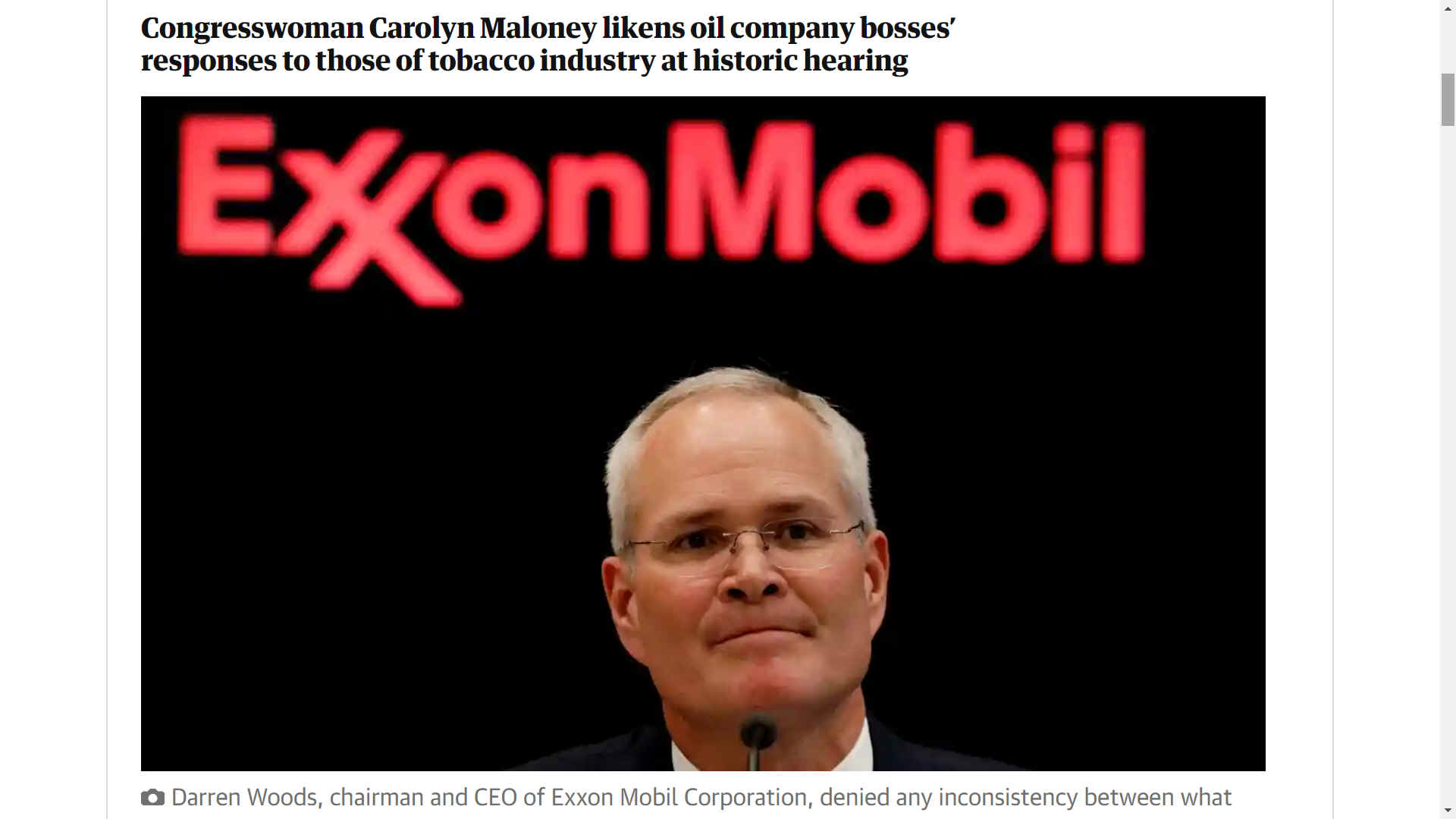
GERIATRIC
UNDERTAKER
- Companies that pay politicians to lobby for them, to
continue with fossil fuels and impede the introduction of electric
vehicles and green
hydrogen, should be prosecuted for human rights
violations. Hannibal
Lecter would be pleased to have this old friend for
dinner.
Fake
news, is the opposite of factual reporting. Fake news is
generated for many reasons, but ultimately it is to steer the
less well informed to the wrong conclusion, usually for the
financial benefit of big business, banks and politicians.
Climate deniers are good examples of dangerous (criminal)
fakery, typically paid mouthpieces to sway voters to allow
poisonous gases and particulates to keep being pumped into our
atmosphere. That of course affects human lives in terms of lung
cancer and rising
sea levels, caused by anthropogenic
(human) effect on planet
earth.
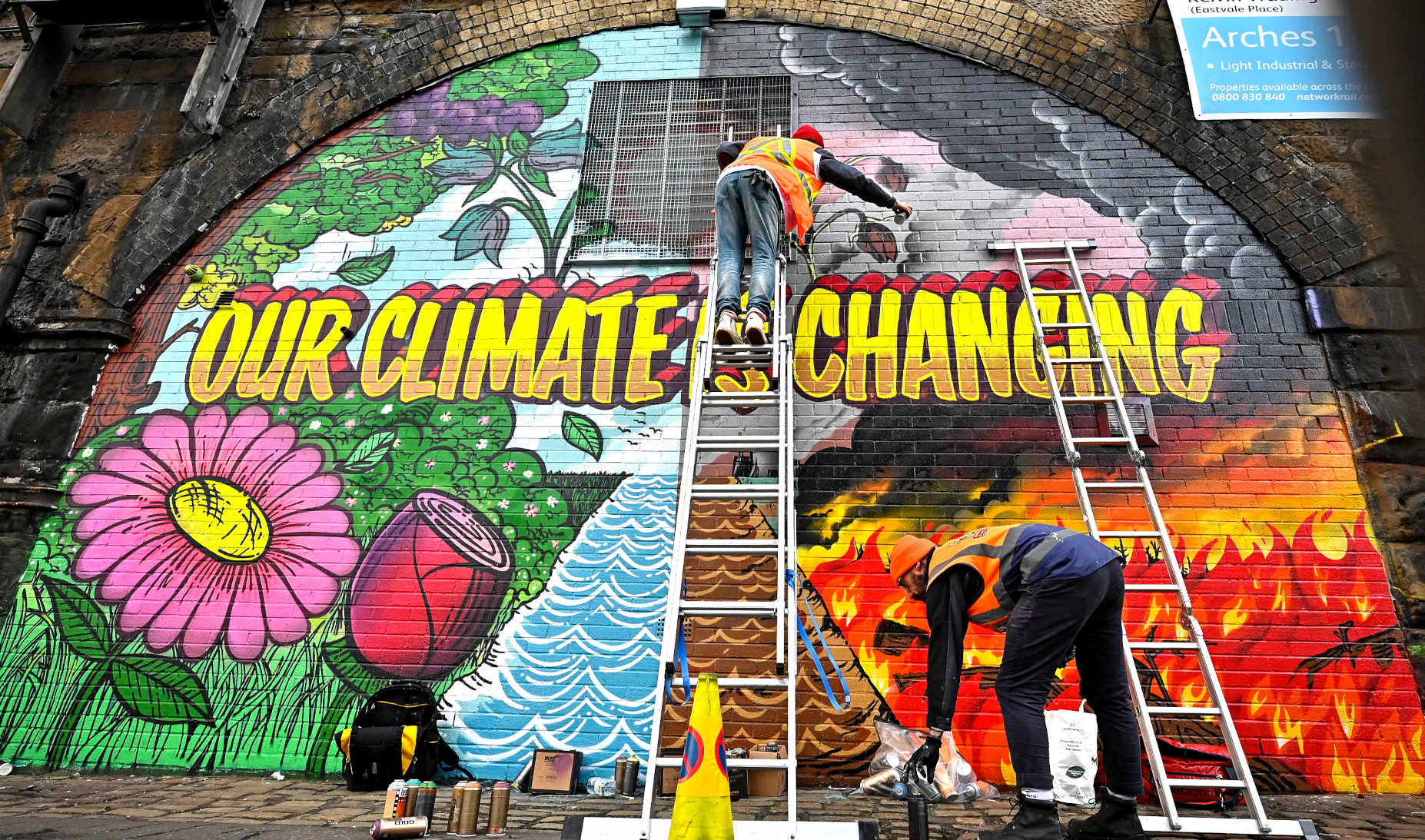
CLIMATE
INACTION SUMMIT -
Human activities are releasing nearly 10 Gegatons of Carbon (about 36 Billion tons of CO2) into the atmosphere every year, driving atmospheric CO2 concentrations to 400 parts per million
(ppm) from their original pre-industrial levels of 280 ppm. This increase in CO2 and other
greenhouse gases concentrations traps additional energy in the earth's climate system. What happens to this "extra" energy (0.5-1 watt/m2) remains a mystery to many outside the field of climate and sciences.
By
way of another famous example of fake news, Boris
Johnson, used 'Brexit'
as a battering ram to sway his own party members, and British
voters, to elect him Prime
Minister, but the figures upon which he mounted his
election campaign have since been disproved. He had to be able
to lie effectively, or rather spread misinformation, to achieve
this, even deceiving Her Majesty Queen
Elizabeth as to suspending (the famous unlawful prorogue
of) parliament. Itself, a fake (false) move to help him get
elected. But what a cheek; lying to the Queen of England. What
level of bull did he employ in explaining himself, and why
didn't Her Majesty immediately call for a general election?
Of
course, the High Court unraveled the fakery, explaining why Bojo's
assurances to the Queen were unsound.
It is probable, and presumably, that there was nobody else who
could bring about Brexit within the timeframe and pressing
parameters. And, also allegedly, Boris probably, was playing
his hand at staying in power, on that basis.
MORE
ON FAKERY
Fake news is false or misleading information presented as news. It often has the aim of damaging the reputation of a person or entity, or making money through advertising revenue. However, the term does not have a fixed definition, and has been applied more broadly to include any type of false information, including unintentional and unconscious mechanisms, and also by high-profile individuals to apply to any news unfavourable to their personal perspectives.
Once common in print, the prevalence of fake news has increased with the rise of social media, especially the Facebook News Feed. Political polarization, post-truth politics, confirmation bias, and social media algorithms have been implicated in the spread of fake news. It is sometimes generated and propagated by hostile foreign actors, particularly during elections. The use of anonymously-hosted fake news websites has made it difficult to prosecute sources of fake news for libel. In some definitions, fake news includes satirical articles misinterpreted as genuine, and articles that employ sensationalist or clickbait headlines that are not supported in the text.
Fake news can reduce the impact of real news by competing with it; a Buzzfeed analysis found that the top fake news stories about the 2016 U.S. presidential election received more engagement on Facebook than top stories from major media outlets. It also has the potential to undermine trust in serious media coverage. The term has at times been used to cast doubt upon legitimate news, and former U.S. president Donald Trump has been credited with popularizing the term by using it to describe any negative press coverage of himself. It has been increasingly criticized, due in part to Trump's misuse, with the British government deciding to avoid the term, as it is "poorly-defined" and "conflates a variety of false information, from genuine error through to foreign interference".
Multiple strategies for fighting fake news are currently being actively researched, and need to be tailored to individual types of fake news. Effective self-regulation and legally-enforced regulation of social media and web search engines are needed. The information space needs to be flooded with accurate news to displace fake news. Individuals need to actively confront false narratives when spotted, as well as take care when sharing information via social media. However, reason, the scientific method and critical thinking skills alone are insufficient to counter the broad scope of bad ideas. Overlooked is the power of confirmation bias, motivated reasoning and other cognitive biases that can seriously distort mental immune health. Inoculation theory shows promise in designing techniques to make individuals resistant to the lure of fake news, in the same way that a vaccine protects against infectious diseases.
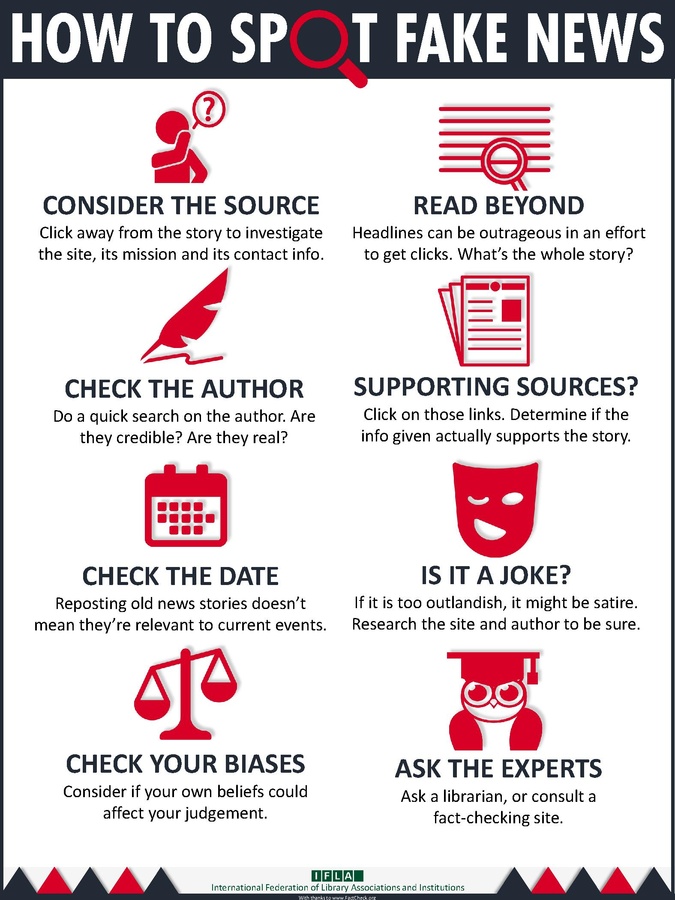
CHECKING THE FACTS
According to an academic library guide, a number of specific aspects of fake news may help to identify it and thus avoid being unduly
influenced. These include: Clickbait, propaganda, satire/parody, sloppy journalism, misleading headings, manipulation, rumor mill, misinformation, media bias, audience bias, and content farms.
The International Federation of Library Associations and Institutions (IFLA) published a summary in diagram form (pictured at right) to assist people in recognizing fake news. Its main points are:
1. Consider the source (to understand its mission and purpose)
2. Read beyond the headline (to understand the whole story)
3. Check the authors (to see if they are real and credible)
4. Assess the supporting sources (to ensure they support the claims)
5. Check the date of publication (to see if the story is relevant and up to date)
6. Ask if it is a joke (to determine if it is meant to be satire)
7. Review your own biases (to see if they are affecting your judgment)
8. Ask experts (to get confirmation from independent people with knowledge).
The International Fact-Checking Network (IFCN), launched in 2015, supports international collaborative efforts in fact-checking, provides training, and has published a code of principles. In 2017 it introduced an application and vetting process for journalistic organisations. One of IFCN's verified signatories, the independent, not-for-profit media journal The Conversation, created a short animation explaining its fact checking process, which involves "extra checks and balances, including blind peer review by a second academic expert, additional scrutiny and editorial oversight".
Beginning in the 2017 school year, children in Taiwan study a new curriculum designed to teach critical reading of propaganda and the evaluation of sources. Called "media literacy", the course provides training in journalism in the new information society.
Always
check the facts for yourself. Check out any references
provided and IP that may be claimed. Does the article make
sense. Be sure it is not just a work of fiction, as in a
(novel) book - where fiction is of course the charm of story
telling.
TYPES OF FAKERY
Claire Wardle of First Draft News, in preliminary findings, identifies seven types of fake news:
1. satire or parody ("no intention to cause harm but has potential to fool")
2. false connection ("when headlines, visuals or captions don't support the content")
3. misleading content ("misleading use of information to frame an issue or an individual")
4. false context ("when genuine content is shared with false contextual information")
5. impostor content ("when genuine sources are impersonated" with false, made-up sources)
6. manipulated content ("when genuine information or imagery is manipulated to deceive", as with a "doctored" photo)
7. fabricated content ("new content is 100% false, designed to deceive and do harm")
Scientific denialism is another potential explanatory type of fake news, defined as the act of producing false or misleading facts to unconsciously support strong pre-existing beliefs.
DEFINITION OF FAKE NEWS
Fake news is a neologism. Fake news, or fake news websites, have no basis in fact, but are presented as being factually accurate.
Media scholar Nolan Higdon has defined fake news as "false or misleading content presented as news and communicated in formats spanning spoken, written, printed, electronic, and digital communication." Higdon has argued that the definition of fake news has been applied too narrowly to select mediums and political ideologies. Fake news also refers to stories that are fabricated that obtain little to no verifiable facts. Even more broadly, some people, most notably former United States President Donald Trump, have broadened the meaning of "fake news" to include all news that was negative about their personal beliefs and actions.
Michael Radutzky, a producer of CBS 60 Minutes, said his show considers fake news to be "stories that are probably false, have enormous traction [popular appeal] in the culture, and are consumed by millions of people." These stories are not only found in politics, but also in areas like vaccination, stock values and nutrition. He did not include news that is "invoked by politicians against the media for stories that they don't like or for comments that they don't like" as fake news. Guy Campanile, also a 60 Minutes producer said, "What we are talking about are stories that are fabricated out of thin air. By most measures, deliberately, and by any definition, that's a lie."
The intent and purpose of fake news is important. In some cases, what appears to be fake news may be news satire, which uses exaggeration and introduces non-factual elements that are intended to amuse or make a point, rather than to deceive. Propaganda can also be fake news. Some researchers have highlighted that "fake news" may be distinguished not just by the falsity of its content, but also the "character of [its] online circulation and reception".
In the context of the United States of America and its election processes in the 2010s, fake news generated considerable controversy and argument, with some commentators defining concern over it as moral panic or mass hysteria and others worried about damage done to public trust.
In January 2017, the United Kingdom House of Commons commenced a parliamentary inquiry into the "growing phenomenon of fake news".
In 2016, Politifact selected fake news as their Lie of the Year. There was so much of this in this United States election year, won by President Donald Trump, that no single lie stood out, so the generic term was chosen. Also in 2016, Oxford Dictionaries selected post-truth as its word of the year and defined it as the state of affairs when "objective facts are less influential in shaping public opinion than appeals to emotion and personal belief." Fake news is the boldest sign of a post-truth society. When we can't agree on basic
facts - or even that there are such things as facts - how do we talk to each other?
Author Terry Pratchett, previously a journalist and press officer, was among the first to be concerned about the spread of fake news on the Internet. In a 1995 interview with Bill Gates, founder of Microsoft, he said "Let's say I call myself the Institute for Something-or-other and I decide to promote a spurious treatise saying the Jews were entirely responsible for the Second World War, and the Holocaust didn't happen, and it goes out there on the Internet and is available on the same terms as any piece of historical research which has undergone peer review and so on. There's a kind of parity of esteem of information on the net. It's all there: there's no way of finding out whether this stuff has any bottom to it or whether someone has just made it up". Gates was optimistic and disagreed, saying that authorities on the Net would index and check facts and reputations in a much more sophisticated way than in print. But it was Pratchett who more accurately predicted how the internet would propagate and legitimize fake news.
BBC 19 NOVEMBER 2021
Several foreign-language Wikipedia pages seen by BBC News are promoting conspiracy theories and making misleading claims about climate change.
A number, including some in Swahili, Kazakh and Belarusian, suggest scientists are divided over its causes.
The overwhelming scientific consensus is global warming is caused by humans.
A representative of the Wikimedia Foundation, which runs Wikipedia, said they were "worried" by the findings and more volunteer editors were needed.
The "climate change" entry on Chinese Wikipedia lists solar activity as one of the possible explanations for rising temperatures around the world today.
Other widely disproven theories listed include unfounded claims about the emergence of a totalitarian world government and tie calls for climate action to secretive financial interests.
On Croatian Wikipedia, more than a third of the page on global warming is devoted to questioning the science of climate change, while also pushing conspiratorial views.
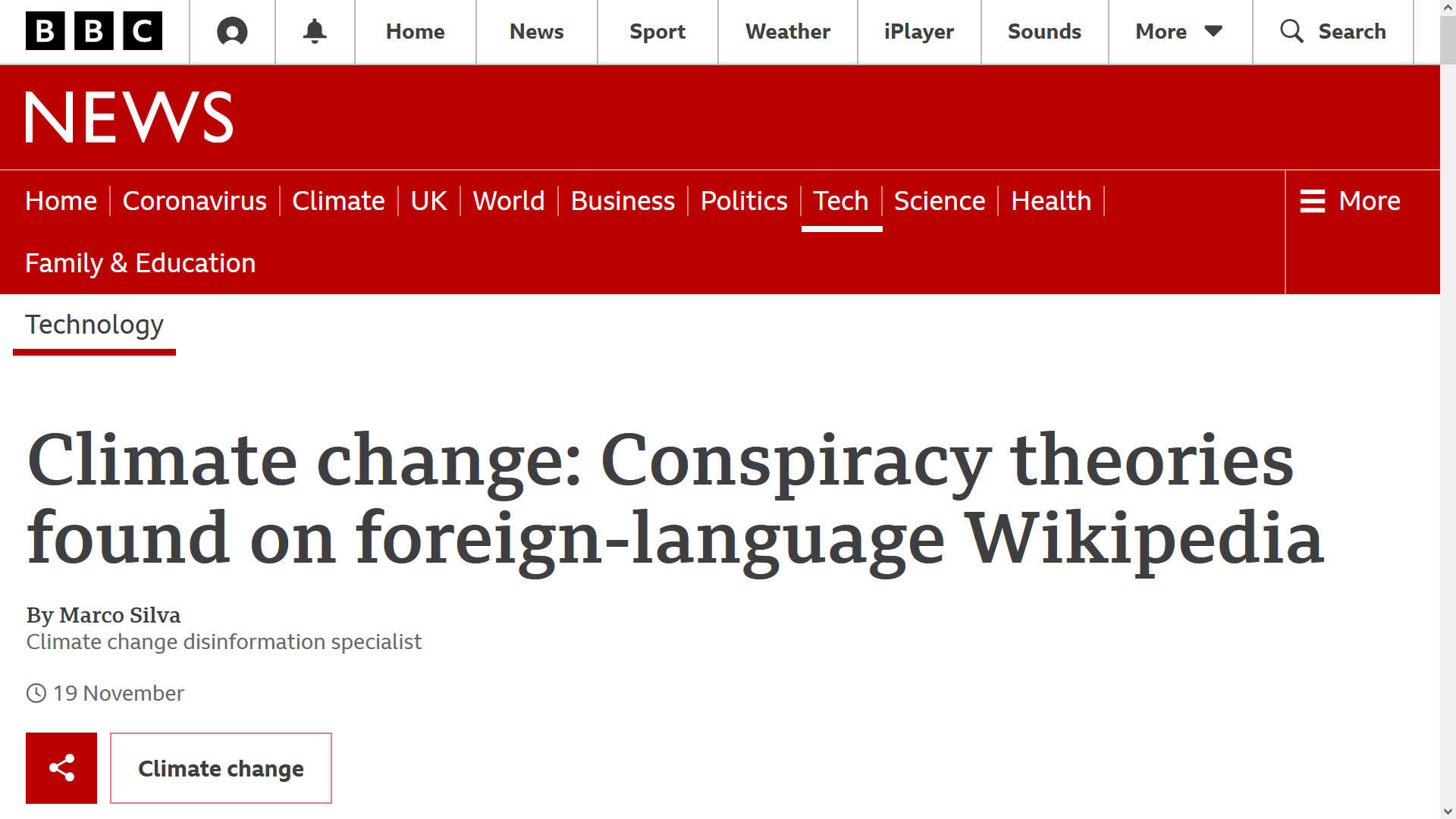
Bad information
"This worries me a lot," Wikimedia Foundation senior programme strategist Alex Stinson said. "And this is why we need more people involved in this project."
Wikipedia is published in more than 300 different languages, each with its own original content and volunteer editors.
Open for anyone with an internet connection to edit, the quality of its content is entirely dependent on those volunteers.
More volunteers in different languages would decrease the chances of conspiracy theories and bad information lingering on the site, Mr Stinson said.
Yumiko Sato, a Japanese writer based in the US who has investigated misinformation on the platform, said: "Wikipedia only works if the editing community is large and diverse."
Launched in 2001, the online encyclopedia is one of the world's most visited websites.
The English-language version, the largest, has more than 40,000 users actively editing it each month.
Its climate-change pages have a group of dedicated volunteer editors who actively patrol for any sign of bad information or
pseudo-science.
But the same does not apply to many of the pages in languages other than English.
In more than 150 languages, fewer than 10 people a month regularly edit any pages.
"[These versions] are much smaller and lack editorial diversity, so that makes them vulnerable to manipulation," Ms Sato said.
Push back
One of Wikipedia's core principles is self-governance.
So, unless the community of editors steps in, the Wikimedia Foundation can do little.
"The foundation has never intervened on editorial policies directly and that is not what we do," Mr Stinson said.
"We need to push back on this disinformation in science - but that only works if the science-literate show up in that language, in that context, and that Wikipedia [version]."
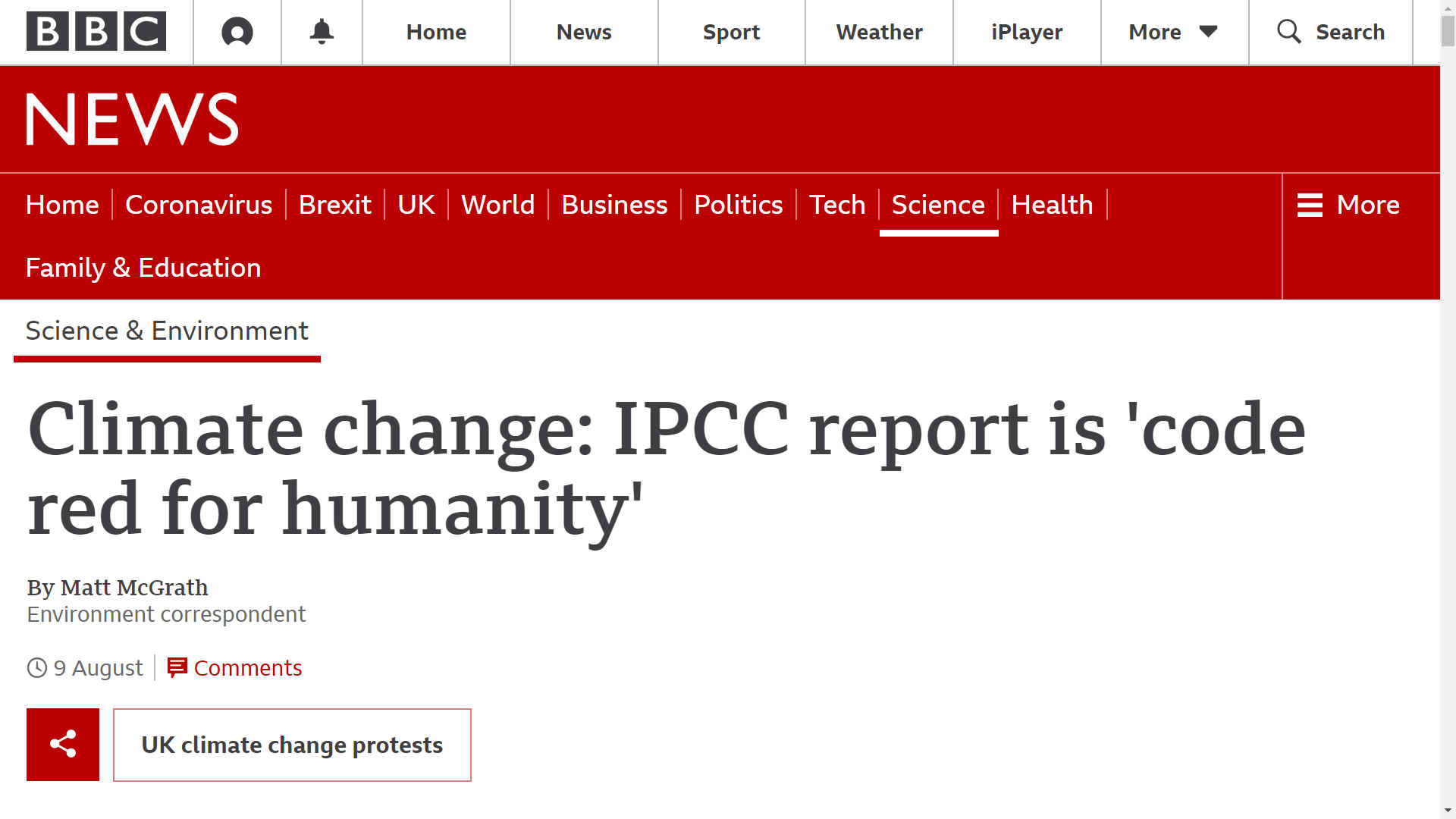
UN'S
IPCC CODE RED -
Although not actually using the above terminology in the
Report, August 2021, it has been interpreted by most people
reading the document as a Code Red for Humanity. Code Red is
equal to DefCon1,
in military terms.
REAL
NEWS
The
IPCC's Report from August 2021, put us at Code Red. The
writing was on the wall in 2018, but world leaders carried on;
business as usual. it looks very much as if in 2024 it will be
the same story. By then we'll be lucky to have any ice in the Arctic. The same for
polar
bears.
THIS
IS REAL: ISLAND
NATIONS SINKING UNDER CLIMATE CHANGE FLOOD THREAT - A TO Z
1.
Cabo
Verde, Republic of
2.
Carteret Islands
3.
Fiji, Republic of
4.
Ireland
5.
Hawaii
6. Japan
7.
Kiribati
8.
Maldives
9.
Marshall
Islands, Republic of the
10.
Micronesia,
Federated States of
11.
Palau
12.
Sarichef Island
13.
Seychelles
14. Solomon Islands
15.
Tangier Island
16.
Torres Strait Islands
17.
Tuvalu
18.
United Kingdom
LINKS
& REFERENCE
https://www.bbc.co.uk/news/technology-59325128
https://www.theguardian.com/law/2019/sep/24/boris-johnsons-suspension-of-parliament-unlawful-supreme-court-rules-prorogue
https://www.un.org/en/climatechange/events.shtml
Please use our A-Z
INDEX to navigate this
site
|




